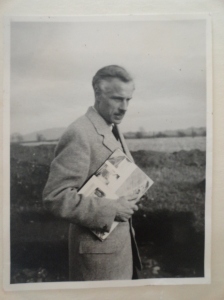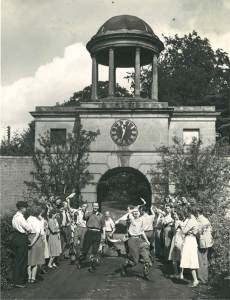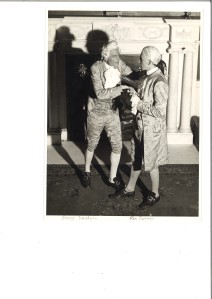Now I’m at the stage of reading through all the interview transcriptions and memoirs, I wanted to share with you some of the rich and vivid quotes I’ve taken from the many interviewees and memoir respondents, to give a flavour of the College as it was in its heyday and to highlight some points of particular interest. Some of the quotes are taken from a previous round of interviews, undertaken by Sarah Kay, Project Curator, and Brenda Hough, former volunteer Archivist, in the early 2000s. The rest are interviews from the last year or from collected memoirs over that period.
Background to the Development of the College – the use of stately homes
It was not a certainty that Attingham Park and Hall would become a general adult educational establishment. From correspondence between 1943 and 1947, clearly a range of conversations about the future usage of Attingham took place before it became a College in 1948.
It is interesting to note that a number of the colleges which evolved post-war in other stately homes became associated with particular groups and interests. So Denman College, at Marcham Park in Oxfordshire, became a College for the Women’s Institute in 1948 and remains a thriving WI educational institution to this day. Wortley Hall, a stately home near Barnsley and the seat of the Earls of Wharncliffe until the Second World War, was taken on in 1950 by a group of local trade union activists who identified the hall as a possible educational and holiday centre, and established a co-operative which succeeded in purchasing the hall for those purposes. It is still used by trade unions and by the Raymond Williams Foundation, as well as being a first-class wedding/social venue. Hawkwood College, a former stately home in Gloucestershire and seen by some as something of a ‘daughter’ college to Attingham, was bought by followers of Rudolph Steiner in 1947, the Whincops. It was later managed by Bernard Nesfield-Cookson – a close friend of Sir George Trevelyan who had previously taught at Attingham – and his first wife, Eileen. It remains a context for short courses on the theme of creative exploration in personal and spiritual development, arts and crafts, music, health and well-being, as well as nature and sustainability.
Fewer of the general adult education colleges have survived.
Letter from M. Somerville to Lady Berwick
‘I have been thinking about a WI college, if indeed we are to have one. I have heard almost nothing about it but I presume we should be tenants of some suitable large mansion – it seems improbable that you could ever find sufficient men and maids to staff Attingham Park adequately these days. Have you ever thought about possibilities in connection with the idea of the WI College? We should, I think, be more desirable tenants than those you are now considering who might be organised by the type of extreme socialist who is so very difficult to live with!’ (reference to the College?!!)
Geoffrey Toms – Former Warden (1971 – 76)
‘The world of residential education has naturally changed a great deal – there was a spate of founding colleges after the war. They were led by charismatic personalities – George Trevelyan is a good example of this’.
The Residential Experience
So many memories of Attingham College are connected with the physical experience of being a resident – remembering the park, the bedrooms, the details of student life.
Susan Morgan, former College student, said, in a beautifully evocative written memoir:
‘I have wonderful memories of staying at Attingham as an A level student at Shrewsbury Technical College. Lectures I remember were Karl Marx and William Golding’s ‘Lord of the Flies’. Sir George Trevelyan climbed Caer Caradoc with us and chatted with us when we were dining later.
We played records in the lecture room and I have loved Schubert’s Great C Major ever since. The impact of the wonderful surroundings and looking out over the deer park has remained with me.
Nights were spent in dormitories above the front door and the curtained beds were possibly four to a room. I remember having a nightmare, thrashing about in the curtains concerning boys killing pigs – thanks to the lecture earlier!’
John Hassall, former student, stressed the importance of being ‘away from the workaday world’. Attingham provided an early taste of university for John who went on to become a schoolteacher – it ‘challenged’ him, providing a confidence boost and a chance to meet people from broad backgrounds.
Jancis Mander, a student on one of the very first courses at Attingham in 1948, the English Folk Dance and Song Society, remembers vividly her experience of staying at Attingham and various antics at the time!
‘I was in a dormitory of six where our sleep was disturbed by a dive bombing bat. Next morning, we woke to find all of our wardrobes were in a row in the middle of the room and all six of us had our hair tied to our bedheads; none of us had known!’ And another…..
‘We’d no sooner got into our beds then the door was flung open and there was a hosepipe sprayed on us and Nibs Matthews who ended up as the Director of the English Folk Dance Society was at the front of this hosepipe….we were soaked!’
English Folk Dance Society Summer School 1948
Frances Farrer, author and journalist, remembers being told that the bedspreads, with Bannatyne prints, were created from the cotton sheets taken out of the attic at Attingham – a great sense of ‘taking the thing at hand’ and that post-war spirit of making do and mending.
Marcia Taylor, Head Cook from 1956 to 1958 recalls:
‘The bedrooms for the staff were 92 steps up to the top of the house (no lift then) so you made sure you had everything you needed until you had finished work at about 2, 2.30, when we had the afternoon off until we started again at about 5 pm to do the evening meal, when there was a course in’.
Variety of Courses
Mike Threadgold, former Head Gardener:
‘They had all sorts – they had sheep farming, they had the hippies here one time. Lord Harlech’s daughter all them was here one time. I can remember seeing them out on the front with her little baby in her arms, Lord Harlech’s daughter. She was here. And all them sorts of people, these hippies, they was the rich hippies as we called ‘em. He used to have a hippy week always, Sir George did, and it’d be full of hippies, all round about. And they’d be sleeping down the Mile Walk in sleeping bags…’
Geoffrey Toms, former Warden
The College was ‘unusual in 2 ways – undoubtedly the building and its size enabled the great variety of courses…the building added very much to all the facilities and the great attraction of an 18th century building and the astonishing grounds’. Geoffrey felt it had a special appeal, more so than other colleges. He also said that ‘it was in terms of student numbers the largest of the colleges’ – it had a total of 70 beds at its height and had an ‘astonishing range of courses’, covering music, contemporary culture, current affairs, craftsmanship.
On Sir George
Despite up to 45 courses a year and working as chief networker and leader of many of the courses over the whole 24 year period during which he was Warden, enthusiasm and ‘joie de vivre’ seem to typify Sir George Trevelyan.
‘He used to wave and jump about – I think it was his nerves. That’s what made him appear eccentric’
Mike Threadgold
Sir George took many of the courses himself. John Hassall remembers his course on Gerard Manley Hopkins, where Sir George was ‘very much the inspiration of the place’ … ‘declaiming the Wreck of the Deutschland’.
Merrion Wood, former Caretaker’s son, who lived at Attingham as a child remembers Sir George’s great sense of fun – ‘Sir George was like a big kid’. He recalls that Sir George was ‘always up to antics’, especially at Christmas and bonfire night, which was celebrated in the courtyard then – with a big bonfire. Sir George would leap over the bonfire – performing ‘his party piece’. Merrion remembers he always sang ‘On Ilkley Moor Bah’t ‘At’ as he did it!
‘He was wonderful to us as staff – he was always there for us. He’d always pop his head round the door and say ‘hello girls’. You could always go and talk to him…and he made you feel important’ –
Mrs Carole Bowdler – ‘jack of all trades’ laundry and cooking – worked at College in the 1960s – recorded in 2002
Paul Fletcher, who is currently Trustee of the Challice Well, was involved with Sir George in the Wales Network from 1979-1989 and spent considerable amounts of time with him. He recalls that Sir George was ‘great fun and believed in play’. He would put nettles into boiling water and give people individual readings for the New Year! He had stuffed rabbit toys in his suitcase which he saved to give to any children he ran into and always carried with him.
Pam Turner, former student, gave a wonderful description of Sir George, the thespian, as he had a great love of theatre and performance. She suggested that Sir George just played himself in theatre productions, that people ‘dreaded being in performances with him as he made up lines and never bothered to learn the actual lines so could never be relied on for cues’! During the performances at New Year, people stayed in costume the whole time as they felt it fitted with the atmosphere of the stately home and Sir George made them stay in part!
Sir George Trevelyan and Ron Turner in ‘School for Scandal’, 1957
The Spiritual courses
There is no doubt that the evolution and growth of Sir George’s ‘esoteric’ courses drew large crowds and distinguished Attingham definitively from other similar colleges but also divided people in their responses. As Geoffrey Toms commented, they attracted a very diverse and sometimes challenging group of people. Geoffrey was part of the Birmingham University Extra Mural Department – who were ‘very concerned’, as were the Local Education Authority.
There is a sense from some people that he took everything with a pinch of salt whilst, at the same time, a spirit of exploration and experimentation underpinned everything he did – including into God and the God within. Frances Farrer commented that ‘George was not an enemy of reason but he was not in thrall to it as we are now’.
Michael Ray, former student, attended one course himself as a sixth former and was very impressed with Sir George and his ‘deep spirituality’, which he compared with that of the late John Taverner, Composer, who died recently, though not based on a Christian faith in quite the same way. He felt this aspect of Sir George was very apparent, and very ‘deeply felt’.
Sir George apparently said: ‘If I do nothing in this life other than gain a deeper understanding of death it will be a life well spent’. This was in part a reference to his well-known and pioneering Death and Becoming course – Ruth Nesfield-Cookson, Sir George Trevelyan’s long-time Secretary at Attingham and at the start of the Wrekin Trust.
More quotes to follow!


